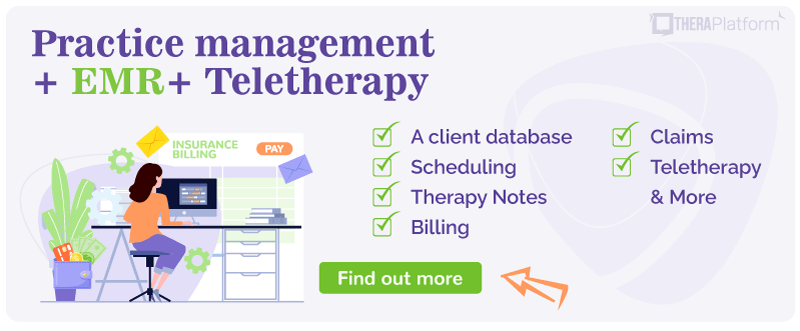Self-employed therapist tax deductions

Self-employed therapist tax deductions are available to clinicians who manage their own practices. Being self-employed, whether through seeing a few clients privately or owning a private practice, offers several benefits such as flexibility and independence. Therapists have the freedom to choose their client base, set their own schedule, and manage their own workload.
When it comes to taxes, self-employed therapists will need to keep records and file differently than those who have an employer. A thorough understanding of self-employed therapist tax deductions can help ensure you save in areas you are entitled to.
What are self-employment basics?
Let’s start with the basics of self-employment tax. When a therapist is self-employed, they are responsible for paying Social Security and Medicare taxes when filing taxes annually.
Traditional employees have these taxes automatically withheld from their paychecks. Additionally, the employer typically covers a portion of these taxes on behalf of the employees.

When comparing traditional employment taxes with self-employment taxes, it’s important for self-employed therapists to keep a few important points in mind. Self-employed therapists will be responsible for paying the full amount of Social Security and Medicare taxes annually. They are also responsible for paying income tax on their earnings.
Self-employed therapists must keep these end of year tax obligations in mind when managing their finances. Some self-employed therapists may choose to set aside funds throughout the year to cover the potential amount due.
Identifying tax-deductible expenses
Self-employed therapists’ have certain flexibility within their operations that can provide them with the ability to declare certain expenses as tax-deductible. Identifying and claiming tax-deductible expenses can significantly reduce a self-employed therapist’s tax liability.
Here are some common deductible expenses:
- Home office expenses. If you’re using a dedicated space in your home to conduct therapy sessions (in person or virtually), you can deduct a portion of your rent or mortgage, utilities, and other related expenses.
- Professional development and education. You may be eligible to deduct expenses related to continuing education, conference, professional memberships, and workshops.
- Equipment and supplies. Therapy equipment, such as therapy materials, office supplies, and assessment tools, may be tax deductible for self-employed therapists.
- Health insurance premiums. Health insurance premiums for yourself and your dependents may be deductible.
- Marketing and advertising. Self-employed therapists may be able to deduct costs related to marketing for therapy services such as website development, online advertising, and promotional materials.
- Business-related travel. If you’ve incurred travel expenses over the last year for business-related purposes, such as traveling to clients for therapy sessions or attending conferences, these costs may be tax deductible.
- Retirement contributions. Contributions to retirement accounts such as a Solo 401(k) may qualify as a deduction for self-employed therapists.

Record-keeping and documentation
It’s essential to maintain accurate records for claiming tax deductions and ensuring compliance with tax regulations, as an IRS audit is possible.
Self-employed therapists should maintain records of all work-related expenses by saving as receipts and other relevant documentation, to support the deductions being claimed.
To ensure comprehensive record-keeping, consider developing a system for organizing and storing financial records. This includes maintaining receipts, bank statements, and invoices for work-related expenses such as tax-deductible items.
Self-employed therapists may want to consider using accounting software or hiring a professional bookkeeper to streamline the record-keeping process.
Maximizing tax savings strategies
Certain strategies can help self-employed therapists maximize their tax savings.
Utilizing retirement accounts
Contributing to a retirement account designed specifically for self-employed individuals can not only help therapists save for retirement but may also reduce their taxable income.
A Simplified Employee Pension Plan (SEP) allows a self-employed therapist to contribute up to 25 percent of their pay to a traditional IRA (SEP-IRA). Self-employed therapists can also contribute to a solo 401(k); a traditional 401(k) plan that covers a business with no employers, or the individual and his or her spouse.
Timing expenses
Therapists can strategically time their expenses in order to maximize their deduction benefits. This might include purchasing new materials or attending conferences prior to the current tax year ending in order to qualify these expenses for deductions during the current year.
Structuring business entities
Different business entities (LLC, partnership, sole proprietorship) have unique tax implications. Therapists may benefit from structuring their therapy practice as a specific type of business entity.
Working with a qualified tax professional
A qualified tax professional who specializes in self-employment taxes can provide guidance as to the most tax-efficient options for your practice. This includes structuring your practice as a certain business entity type, identifying deductions, and ensuring compliance with tax laws and optimizing self-employed therapist tax deductions.
Start 30-day Free Trial and explore TheraPlatform. HIPAA Compliant Video and Practice Management Software for Therapists.
Tax compliance and reporting
Self-employed therapists will need to follow the general tax filing deadline of April 15th each year. In order to avoid underpayment penalties, self-employed therapists may also need to file quarterly estimated taxes. These estimated tax payments, due on the 15th of April, June, September, and January of the following year, can be filed using the Form 1040-ES.
Self-employed therapist tax deductions and income are reported using Schedule C (Form 1040). Therapists can refer to documentation of income and expenses maintained throughout the year to complete this.
It’s important for self-employed therapists to avoid some common tax mistakes. These include underreporting income, overlooking eligible self-employed therapist tax deductions, deducting expenses above the allowed amount, and failing to keep accurate records. To help prevent these mistakes, therapists can use accounting software, consult with a tax professional, and stay up to date on tax laws.
Potential risks and compliance issues
Self-employed therapists must follow the guidelines provided by the IRS to understand and follow tax obligations. Guidelines include the requirements for paying self-employment taxes, reporting income, and maintaining accurate documentation. Failure to comply with IRS guidelines can result in penalties and audits.
Claiming excessive deductions, reporting inconsistent income, and failure to report cash payments accurately can trigger an audit of a self-employed therapist’s taxes, and potentially costly penalties. The IRS may also flag a self-employed therapist for an audit when there is a discrepancy between reported income and the industry norms.
To mitigate the risk of a tax audit and maintain compliance with IRS regulations, self-employed therapists should accurately report all income, avoid claiming self-employed therapist tax deductions that are not legitimate, and keep detailed records of all business related income and expenses throughout the tax year. Obtaining guidance from a tax professional can also help ensure compliance with tax laws and regulations.
Case studies and examples
Here are a few case studies that illustrate the tax compliance and reporting processes, potential risks, and strategies for maintaining compliance.
Example 1: Rachel is a self-employed therapist who operates her teletherapy practice from a home office. Throughout the year, Rachel diligently keeps track of her expenses, including her rent, utilities, supplies, and professional development courses.
Rachel is able to accurately report her expenses on Schedule C when filing her taxes. She can maximize her tax savings and maintain compliance with IRS regulations by leveraging tax deductions for her home office and educational development courses.
Example 2: Jack accepts private pay through cash payments for his sessions as a self-employed therapist. In the past, he did not consistently report this income accurately, which led to discrepancies on his tax return.
Jack consulted with a tax professional, who provided recommendations for organizing and maintaining records of all transactions within his practice. He now accurately reports his income and therefore improving compliance with IRS guidelines and possibly reducing the risk of triggering a tax audit.
Working as a self-employed therapist offers several benefits, such as flexibility and independence with managing your caseload. Self-employed therapists need to be aware of certain key differences in filing for self-employed therapist tax deductions compared to those who have an employer.
Self-employed therapists will be responsible for paying income tax, Medicare and Social Security taxes at the end of the tax year. Claiming eligible self-employed therapist tax deductions that are backed by thorough records can reduce their tax liability.
Self-employed therapists can be proactive with tax planning for the year and maintain compliance through accurate reporting, record-keeping, and compliance with tax laws. Therapists should consider seeking professional tax advice for personalized guidance.
Resources
TheraPlatform is an all-in-one EHR, practice management, and teletherapy software built for therapists to help them save time on admin tasks. It offers a 30-day risk-free trial with no credit card required and supports mental and behavioral health, SLPs, OTs, and PTs in group and solo practices.
More resources
- Therapy resources and worksheets
- Therapy private practice courses
- Ultimate teletherapy ebook
- The Ultimate Insurance Billing Guide for Therapists
- The Ultimate Guide to Starting a Private Therapy Practice
- Mental health credentialing
- Insurance billing 101
- Practice management tools
- Behavioral Health tools
Free video classes
- Free on-demand insurance billing for therapist course
- Free mini video lessons to enhance your private practice
- 9 Admin tasks to automate in your private practice
References
Cieślik, J., & van Stel, A. (2023). Solo self‐employment––Key policy challenges. Journal of Economic Surveys. DOI: https://doi.org/10.1111/joes.12559
Di Nola, A., Kocharkov, G., Scholl, A., & Tkhir, A. M. (2021). The aggregate consequences of tax evasion. Review of Economic Dynamics, 40, 198-227. DOI: https://doi.org/10.1016/j.red.2020.09.009
Touray, R. (2021). A review of records management in organisations. Open Access Library Journal, 8(12), 1-23. DOI: https://www.scirp.org/journal/paperinformation?paperid=113666
Content provided by TheraPlatform is educational and does not constitute any legal advice.



